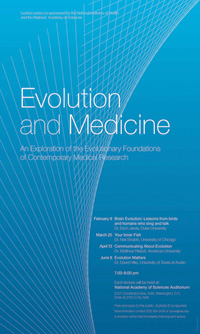Spring 2009 Lecture Series: Evolution and Medicine
The National Institute of General Medical Sciences (NIGMS), the Office of Science Education (OSE), and the National Academy of Sciences (NAS) are partnering to present a lecture series, Evolution and Medicine: An Exploration of the Evolutionary Foundations of Contemporary Medical Research. An outstanding group of scientists will present lectures on evolution from several perspectives and explain why understanding evolution is critical to contemporary biology. The program is open to the general public. Teachers are especially welcome.
Live webcasts will be available and archived at http://videocast.nih.gov/. American Sign Language (ASL) interpreters will be available upon request. If you require this or other reasonable accommodations to participate in this activity, please contact OSE at least 5 days prior to the event at (E-mail) moorec@mail.nih.gov, (Voice) 301-402-2470, or (TTY) 301-496-9706.
All lectures will take place at 7:00 pm in the National Academy of Sciences Auditorium at 2101 Constitution Avenue, NW, Washington, DC. You will need to enter at 2100 C St, NW and show a picture ID. For directions to the National Academy of Sciences, please refer to the NAS Directions page on The National Academies Web site.
February 9 - Brain Evolution: Lessons From Birds and Humans Who Sing and Talk
Whether you love listening to songbirds, enjoy singing, wonder how language evolved, or marvel at the organization of the brain, Erich Jarvis has scientific news for you. His cutting edge research on vocal learning in birds has revolutionized our understanding of vertebrate brain organization and evolution.
Dr. Erich Jarvis is an Associate Professor of Neurobiology at Duke University, a Howard Hughes Medical Institute Investigator, and the recipient of the prestigious NIH Pioneer Award.
March 25 - Your Inner Fish
What does the human hand have in common with the wing of a fly? Are breasts, sweat glands, and scales related? To understand the inner workings of our bodies and the origins of diseases, scientists turn to unexpected sources like worms, flies, and even fish. Dr. Shubin will tell the story of evolution by tracing the organs of the human body back millions of years, long before the first creatures walked the earth.
Dr. Neil Shubin is the author of Your Inner Fish (Pantheon, 2008) and Associate Dean and Professor of Organismal Biology and Anatomy at the University of Chicago.
April 13 - Communicating About Evolution
How can scientists and lovers of science communicate effectively with students and the public? Long gone is the assumption that mountains of evidence are sufficient to change opinions. Instead, Matthew Nisbet argues that scientists need to understand audiences’ worldviews and values. He outlines methods for engaging diverse audiences around the meaning and implications of evolutionary sciences.
Dr. Matthew Nisbet is Assistant Professor in the School of Communication at American University. He has conducted research and written extensively about communication dynamics in policy debates.
June 8 - Evolution Matters
How is evolution relevant to everyday life? Dr. Hillis argues that evolution is central to responding to the threat of emerging diseases, for solving certain crimes, and for identifying agents of bioterrorism, among other uses. Dr. Hillis shares applications of evolution to real life issues and explains why it is critical for tomorrow’s citizens to understand the relationships of living things.
Dr. David Hillis is the Alfred W. Roark Centennial Professor and Director of the Center for Computational Biology and Bioinformatics at the University of Texas at Austin.

